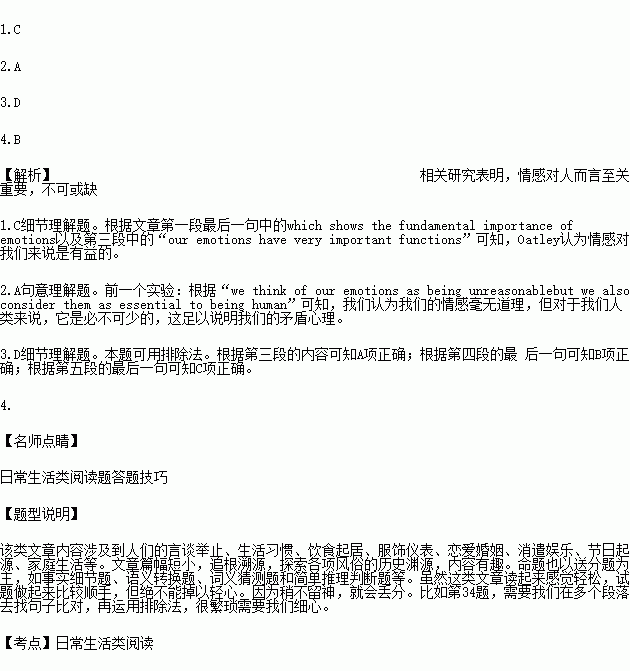题目内容
阅读理解
Many of us still tend to think that emotions can affect reasonable thought,and sometimes land us in trouble. But in recent years psychologists have taken quite a different view. Keith Oatley,Professor of Psychology at Glasgow University,is involved in the research which shows the fundamental importance of emotions.
He believes we are very ambivalent about them:we think of our emotions as being unreasonable,but we also consider them as essential to being human. For example,Mr. Spock,a character in the television series Star Trek,is super?intelligent and he has no emotions at all. However,he is never made captain of the spaceship. Maybe,this is because Mr Spock is not the kind of person you can share your feelings with—a person who shows his emotions.
As Professor Oatley points out,our emotions have very important functions,for example,fear. If we cross the road and a car approaches,we usually stop moving or step back. We stop what we are doing,check what we have done and pay very careful attention to the environment. The emotion of fear makes us take this small series of actions which,on average, help protect our safety.
On the other hand,if things are going well and small problems come up,we find we can solve them with the resources we have to hand. As a consequence, we tend to feel happy and usually continue doing the job.
Anger is an emotion that tends to occur when someone is preventing us from doing something. Then this small “kit” of reactions enables us to prepare ourselves to be quite aggressive to that person,or to try harder,and so on.
Professor Oatley believes emotions generally occur at these important moments in actions. With fear and anger our emotions make us decide to start doing something else, while with happiness they “suggest” we continue what we are already doing.
1.What’s Keith Oatley’s opinion about emotions?
A.They affect reasonable thought.
B.They get us into trouble.
C.They are helpful to us.
D.They are reasonable.
2.What does the underlined part “we are very ambivalent about them” in Paragraph 2 mean?
A.We have contradictory feelings towards emotions.
B.We have similar ideas of emotions.
C.We are quite clear about emotions.
D.We can do nothing about emotions.
3.Which of the following is NOT mentioned in the passage?
A.Fear helps us to be careful about our surroundings.
B.Happiness inspires us to continue what we are doing.
C.Anger may urge us to make greater efforts.
D.Anger tends to do us more harm than good.
4.It can be inferred from the passage that________.
A.we must control our emotions in daily life
B.emotions play a more important part than we realize
C.positive emotions such as love and joy are good for us
D.negative emotions make us continue what we are doing
 小学学习好帮手系列答案
小学学习好帮手系列答案 小学同步三练核心密卷系列答案
小学同步三练核心密卷系列答案
